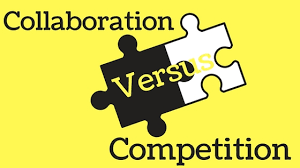7 Ways to Minimize Competition in Teambuilding (While Maxing the FUN)

How many times have you heard a teambuilding participant say, “Yay, I can’t wait to compete. You other teams, watch out; you are all going DOWN!”
Sounds fun, right? Not necessarily. Focusing on an “us-vs.-them” mentality – with all the associated teasing and taunting — can have a distinctly adverse effect on the effectiveness of your teambuilding session, leaving people more divided than when they started. Thankfully, it doesn’t have to be that way. In fact, there’s absolutely no research proving conclusively that teambuilding must = competition. What follows are 7 tips for minimizing the competitive element while maintaining your event’s overall fun and engagement.
1) Start and finish with an all-team activity: As your group size increases, you’ll inevitably want to divide people into smaller teams. Just imagine trying to get a group of 20-30 people to work together on a team project! Mad chaos. At Dr. Clue Teambuilding Scavenger Hunts, we generally ask our clients to form into teams of 4-5 people. But what inevitably happens with small teams? A tribal mentality emerges! Everyone outside of the team suddenly becomes the enemy. One way to counter this is to do a large, all-personnel team activity directly before and directly after the main, smaller-group teambuilding game. For example, perhaps you ask everyone to stand in a big circle, sharing something novel about themselves. Or maybe you have everyone do a giant jigsaw puzzle together, or swap baseball cards to solve a puzzle. By holding an all-personnel activity before and after the small-team exercise, you’re much more apt to get participants to put aside their small-group tribalism and transition back to the one-team/one organization mindset that is, after all, the point of their day together.
2) Minimize prizes: I’ve written about this repeatedly in previous blog entries, but it bears repeating. Lavish prizes inspire desire and craving, along with a strong sense of scarcity. “I want that prize and I won’t let any other team get it.” Before you know it, the team’s only focus is to get the prize, as quickly as possible, no matter what it takes and no matter whom gets hurt in the process. Sounds a little like the Hunger Games, doesn’t it? The solution is to reduce or even eliminate the prizes. I often tell people “Today there will be no prizes. If we’re playing for anything, it’s the esteem of your peers.” Everyone groans for a moment, and then they re-engage. Alternately, if you are going to offer prizes, make them fun, cheap and playful. I’m a big fan of silly putty, magic eight ball and barrels of monkeys. Nerf footballs are fun, too …fun and safe. The point is that people should be concentrating on the activity itself (and what it all means), rather than on getting something of perceived value for themselves (and depriving everyone else of the same reward).
3) Include a cross-team collaborative challenge: One great way to soften the edges of competition during your teambuilding event is to have teams partner with other teams… at least temporarily. During one of our recent teambuilding scavenger hunts, for example, I gave teams a clue that had been cut in half, rendering it unsolvable. Little did they know that one of the other teams had the other half of their clue. If they could think out of the box and share their information with the correct group, both teams would thrive, for mutual benefit. There are LOTS of other ways you can reward cross-team collaboration. One of my favorites: give duplicate resources (let’s say Morse Code sheets) to one team and duplicate resources (say, Braille decoders) to another team. If each team trades their duplicate sheet with the other, both teams get what they need – a win/win. What a great takeaway lesson– that departments and divisions can and should share resources, even when it feels like they’re in opposition.
4) Shift the focus from high score to perfect score: I once read that the great tennis pro, Roger Federer, no longer sees himself as competing against other players. Rather, at this point in his career, he feels that he is competing merely against history (and his own limitations). As long as teams are worrying about getting the high score in comparison to other teams, there will always be heightened external competition. Much better is to challenge people to achieve a perfect score – or even better yet, a “world’s record” – something that’s “never been done before”. In this way, they’re competing against a more abstract milestone, one that has greater meaning than simply beating the opposition.
5) Focus on skills, process and learning: In a typical, competitive teambuilding event, people concentrate on winning the game and taking home the prize. In other words, they focus on how can we get from here to there, as quickly as possible—trouncing the competition in the process. What’s lost in that approach is an examination of the process and the learning. If you want people to move beyond winners and losers, you need to frame the activity differently. You need to emphasize the learning that people can harvest from the event. Sometimes all it takes is a brief statement, like “Today, we’re doing a business simulation. Yes, we will acknowledge the teams with the highest scores, but the POINT is to observe what skills you demonstrated, what you learned about yourself and what you noticed about your teammates.” The learning and the process become primary.
6) Shift the focus from team score to group average: Let’s say Team A gets 10 points; Team B earns 15; Team C achieves 20; and Team D takes home 40. The temptation might be to give a prize to Team D, and maybe a secondary gift to team C. Imagine the difference, however, if you frame the game like this: “As a whole, adding all your scores together and dividing by four, your all-team average is 21.25. Congratulations, the last organization to do this hunt only averaged 17.5 points. You now hold the world’s record score!” If you position your event in this manner in advance of the event, you may well see teams actually helping other teams, boosting the organization’s average score. Magic!
7) Focus on a new definition of success: Coach Vince Lombardi once said, “Winning isn’t everything, it’s the only thing.” In other words, when playing a game of any kind, if you win, you’ve succeeded, if you lose, you’ve failed. Advocates of this philosophy believe in a zero-sum game: only one team succeeds, only one team survives. We’re back Hunger Games territory again! Much better is to invite teams to craft an alternative definition of “success”, one that is independent of the final score. For example, one team might declare, “Whether we come in first, last or somewhere in between, we will laugh a lot and get to know each other better.” Another team might write, “Whatever happens, we will have a ton of fun and get to know more about our strengths and weaknesses.” After all, unless you’re playing a big collaborative activity, there can be only one “winner” per game. How sad if the vast majority of teams feel that they’ve had an “unsuccessful” day, simply because of their final game score. It would be like holding a rock concert and saying, “About 10% of you will enjoy yourselves; the other 90% of you will hate this event and take home the mantle of “Loser”. I don’t know about you, but I don’t like those odds! Change the definition of success from “win at all costs” to something else…anything else, and watch engagement soar!
Give these 7 techniques a try and let me know how they go for you. I’m guessing you’ll be pleasantly surprised by how much people enjoy your game –without the prizes, without the cut-throat competition—and how bonded they all feel to each other at the end.
For more thoughts on this subject, listen in with Dave Blum, Founder and President of Dr. Clue Teambuilding Scavenger Hunts and more:

